
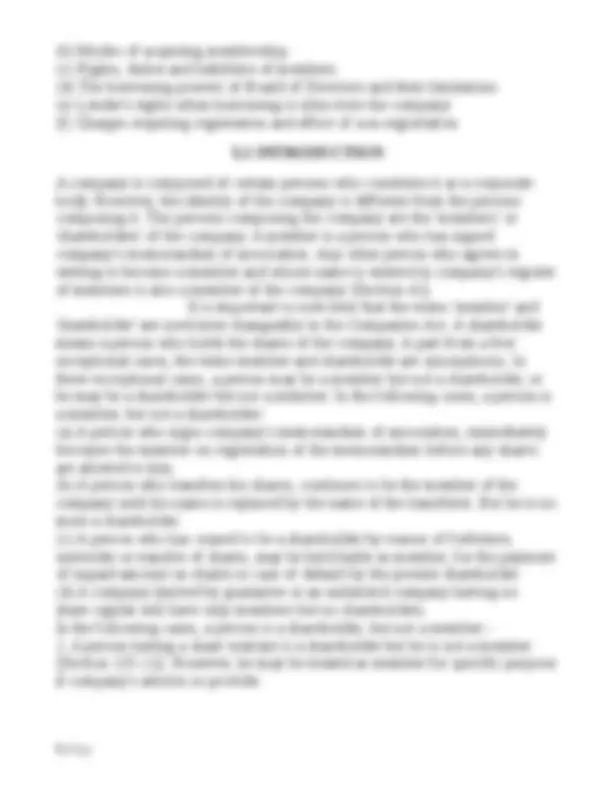
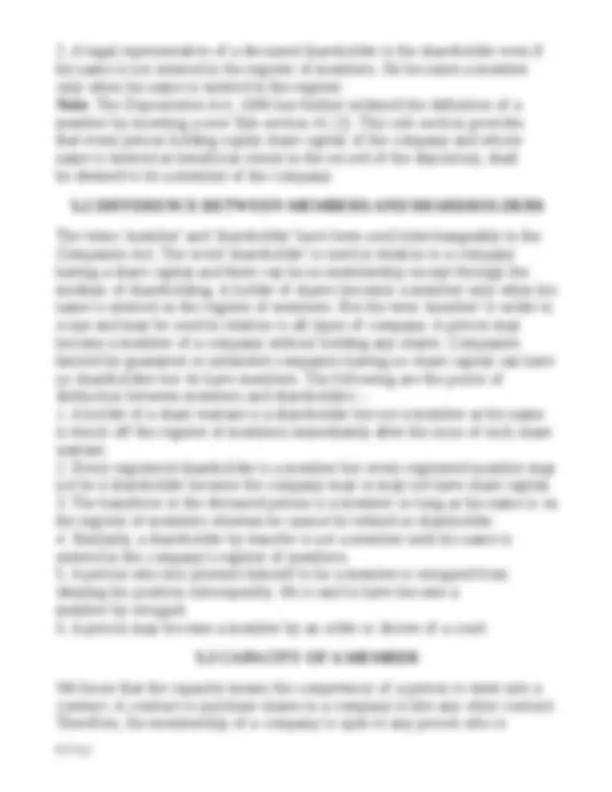
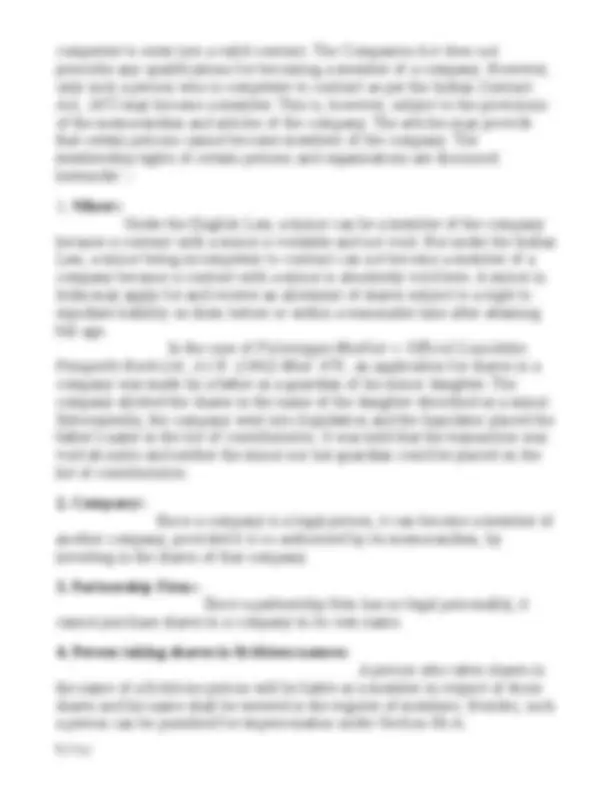
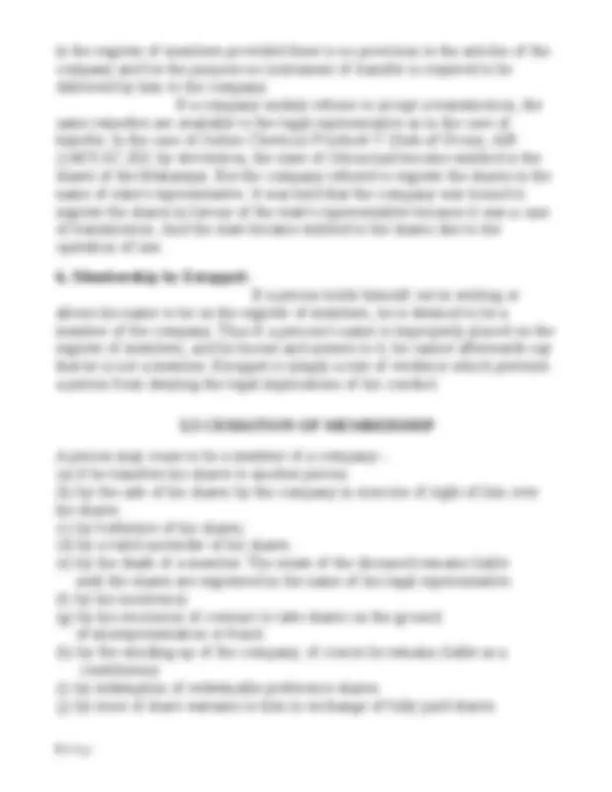
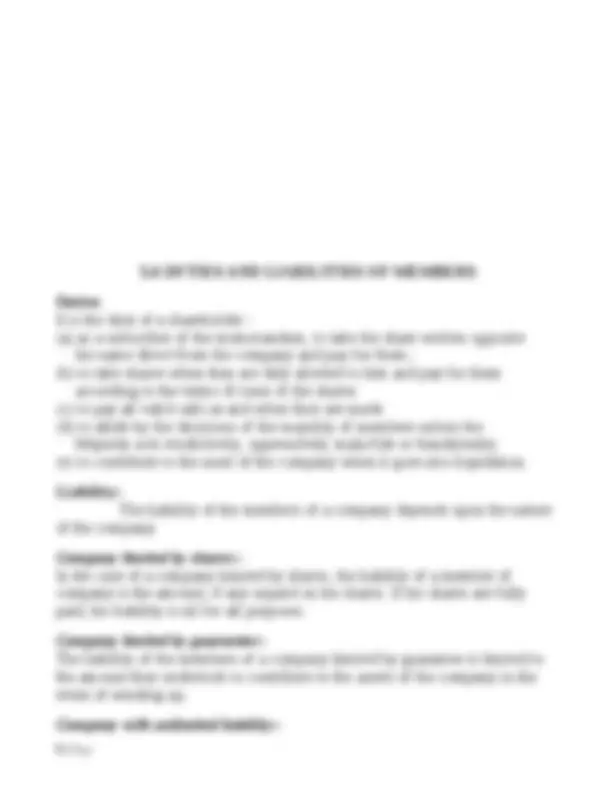


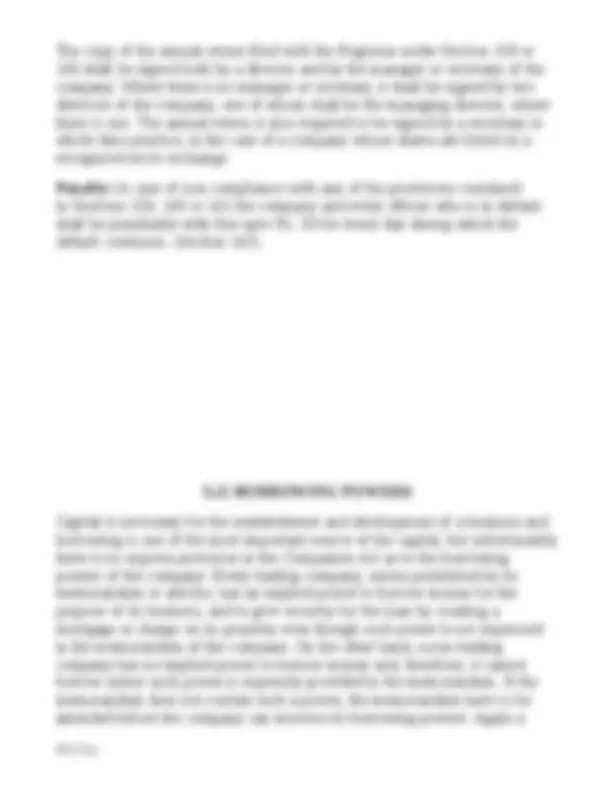
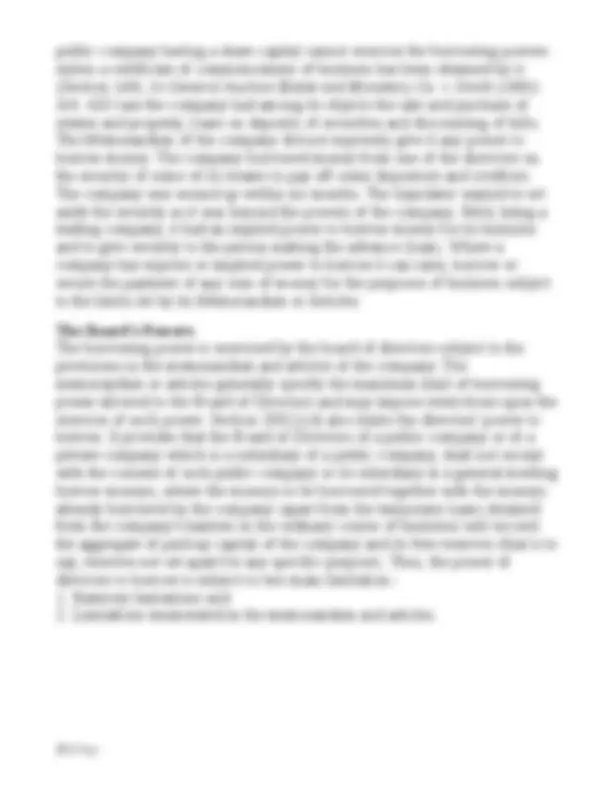
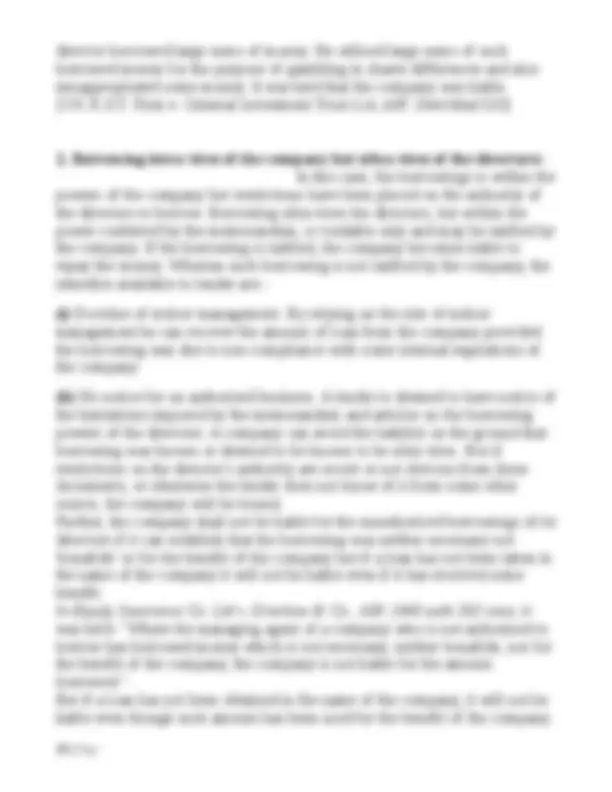


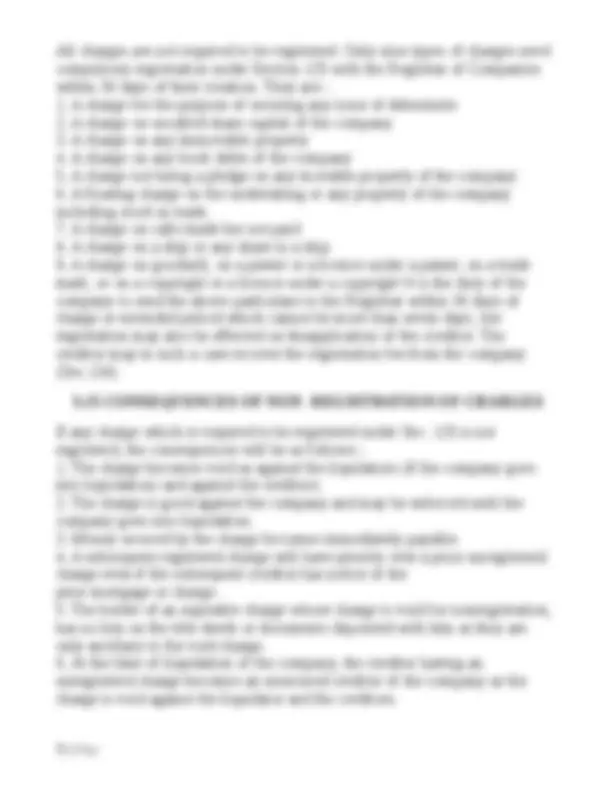
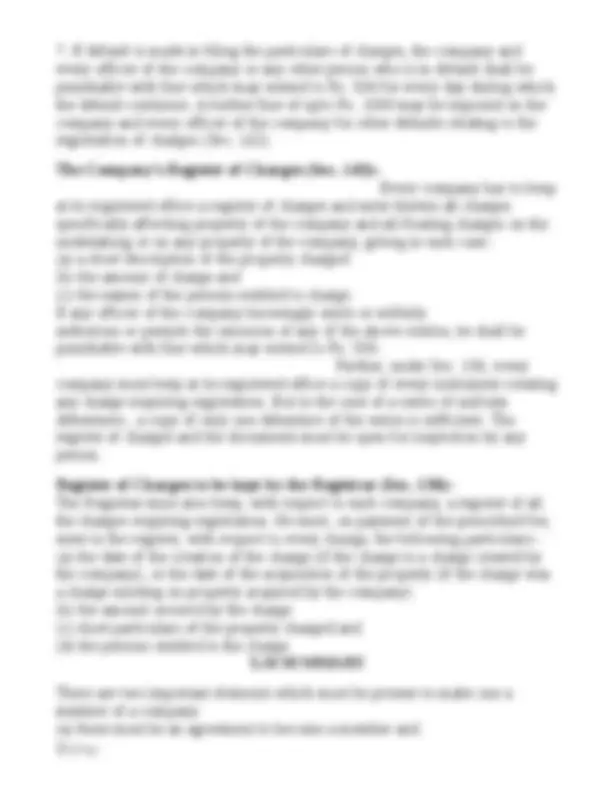
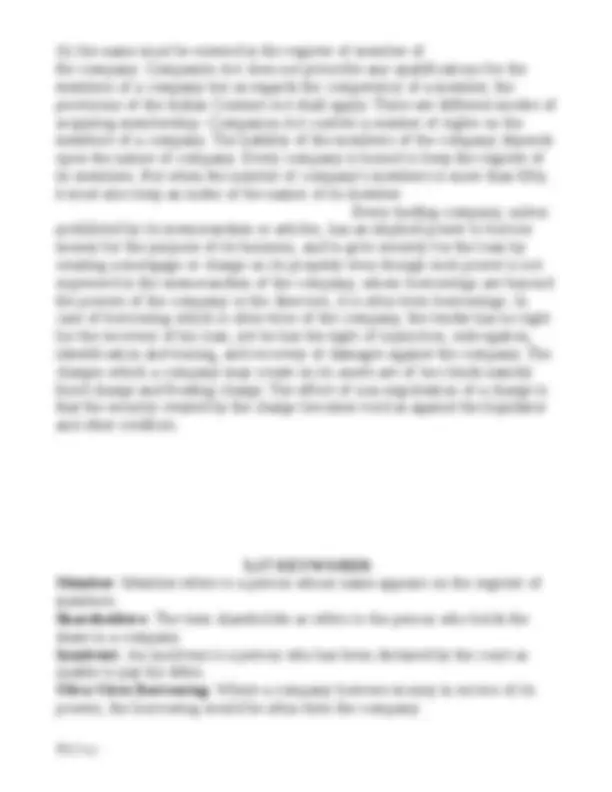
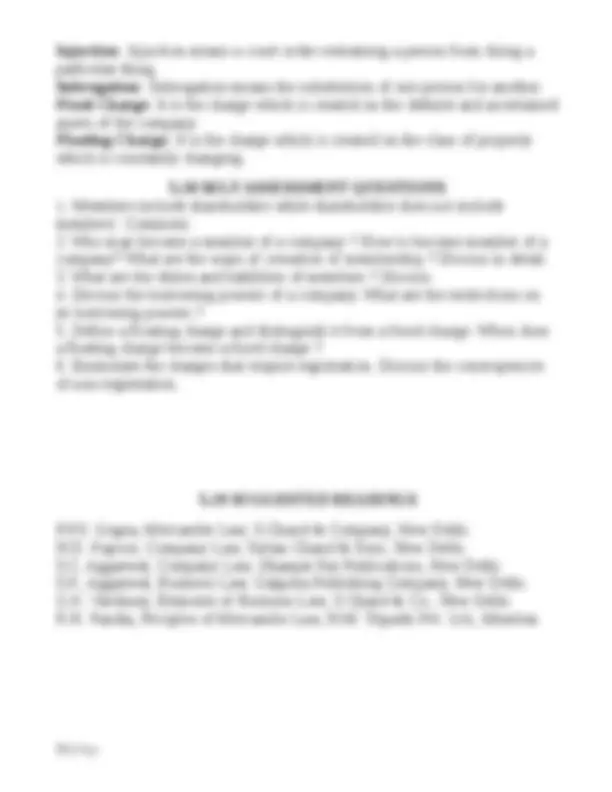


Study with the several resources on Docsity

Earn points by helping other students or get them with a premium plan


Prepare for your exams
Study with the several resources on Docsity

Earn points to download
Earn points by helping other students or get them with a premium plan
Community
Ask the community for help and clear up your study doubts
Discover the best universities in your country according to Docsity users
Free resources
Download our free guides on studying techniques, anxiety management strategies, and thesis advice from Docsity tutors
COMPANY LAW, MEMBERSHIP OF COMPANIES BORROWING POWERS
Typology: Study notes
1 / 24

This page cannot be seen from the preview
Don't miss anything!


















On special offer
BY:- NIKHIL KUMAR PATHAK
MEMBERSHIP OF COMPANIES;
BORROWING & POWERS
By reading this lesson, you would know about (a) Who is a member and who may become member?
5.2 DIFFERENCE BETWEEN MEMBERS AND SHAREHOLDERS
The terms 'member' and 'shareholder' have been used interchangeably in the Companies Act. The word 'shareholder' is used in relation to a company having a share capital and there can be no membership except through the medium of shareholding. A holder of shares becomes a member only when his name is entered on the register of members. But the term 'member' is wider in scope and may be used in relation to all types of company. A person may become a member of a company without holding any shares. Companies limited by guarantee or unlimited companies having no share capital can have no shareholders but do have members. The following are the points of distinction between members and shareholders :-
5.3 CAPACITY OF A MEMBER
We know that the capacity means the competency of a person to enter into a contract. A contract to purchase shares in a company is like any other contract. Therefore, the membership of a company is open to any person who is
competent to enter into a valid contract. The Companies Act does not prescribe any qualifications for becoming a member of a company. However, only such a person who is competent to contract as per the Indian Contract Act, 1872 may become a member. This is, however, subject to the provisions of the memorandum and articles of the company. The articles may provide that certain persons cannot become members of the company. The membership rights of certain persons and organisations are discussed hereunder :-
take the number of shares written opposite his name and be cannot repudiate his contract on the ground of misrepresentation. In the case of Metal Constituents Co., (1902) 1.Ch. 707, a subscriber agreed to take 350 shares. Then, he wanted to rescind the contract on the ground of misrepresentation on the part of the promoters. Held that the subscriber by signing the Memorandum becomes liable to other members in the company brought into existence by his own act. So he can not rescind the contract.
2. Membership by Qualification shares:- Before a person can be appointed a director of a public company, he must take, or sign an undertaking to take and pay for the qualification shares. He thus becomes a member and is in the same position as a subscriber to the memorandum of the company is. 3. Membership by Application and Allotment:- A person may become a member of a company by an application for shares subject to formal acceptance by the company. The ordinary law of contracts applies to the agreement to take shares in a company. An application for shares may be absolute or conditional. If it is absolute, a simple allotment and notice thereof to the applicant will constitute the agreement. If it is conditional, the allotment must be made on the basis of the conditions specified. Where there is a conditional application for shares and an unconditional allotment, there is no contract constituted. R agreed to take shares in a company provided he was appointed local manager of the company. Shares were allotted to him but he was not given the appointment. R refused to take the shares. It was held that R was not a member as his application was conditional and allotment was unconditional. [Roger's case (1868) L.R. 3Ch. 633]. 4. Membership by Transfer:- Where a transfer of share is made and the transfer is registered with the company, the transferee becomes entitled to be placed on the company's register of members in the place of the transferor in respect of the shares so transferred. 5. Membership by Transmission:- On the death of a member his shares rest with his legal representative. The legal representative is entitled to be registered as the holder of the shares and to get his name entered as member
in the register of members provided there is no provision in the articles of the company and for the purpose no instrument of transfer is required to be delivered by him to the company. If a company unduly refuses to accept a transmission, the same remedies are available to the legal representative as in the case of transfer. In the case of Indian Chemical Products V. State of Orissa, AIR (1967) SC 253, by devolution, the state of Orissa had become entitled to the shares of the Maharajas. But the company refused to register the shares in the name of state's representative. It was held that the company was bound to register the shares in favour of the state's representative because it was a case of transmission. And the state became entitled to the shares due to the operation of law.
6. Membership by Estoppel:- If a person holds himself out in writing or allows his name to be on the register of members, he is deemed to be a member of the company. Thus if a persons's name is improperly placed on the register of members, and he knows and assents to it, he cannot afterwards say that he is not a member. Estoppel is simply a rule of evidence which prevents a person from denying the legal implications of his conduct.
A person may cease to be a member of a company:- (a) if he transfers his shares to another person. (b) by the sale of his shares by the company in exercise of right of lien over his shares. (c) by forfeiture of his shares; (d) by a valid surrender of his shares. (e) by the death of a member. The estate of the deceased remains liable until the shares are registered in the name of his legal representative. (f) by his insolvency. (g) by his rescission of contract to take shares on the ground of misrepresentation or fraud. (h) by the winding-up of the company, of course he remains liable as a contributory. (i) by redemption of redeemable preference shares. (j) by issue of share warrants to him in exchange of fully paid shares.
Every member of an unlimited company is liable in full for all debts contracted by the company during the period he was a member.
When a person becomes a member of a company he is entitled to exercise all the rights of a member until he ceases to be a member in accordance with the provisions of the Act. The rights of a member can be classified under the following heads:-
(A) Statutory Rights Statutory rights are those which are given to the members by the statute, i.e. the Companies Act, 1956. No document of the company can take away or modify such rights. Such rights, for example, are:-
(B) Documentary Rights There rights are the rights given by the two basic documents i.e. memorandum of association and articles of association. The company may also give certain rights to its members by expressly providing for themin the memorandum or the articles of the company.
(C) Legal Rights These rights are given to members under general law. For example, a person who has taken shares of a company on the faith of a misleading prospectus can avoid the contract and claim damages under the general law.
5.8 REGISTER OF MEMBERS (SEC. 150)
It is the statutory obligation of every company to maintain a register of its members containing the following particulars:- (a) The name and address and the occupation, if any, of each member (b) In the case of a company having share capital, the shares held by each member and the amount paid or agreed to be considered as paid on those shares (c) The date on which each person was entered in the register as a member (d) The date on which any person ceased to be a member.
Every company is required to file with the Registrar an annual return containing certain particulars relating to the company. The object of filing the annual return is to enable the Registrar to record the changes that have occurred in the constitution of the company during the years. The particulars to be stated in the annual return are different for the companies having a share capital, and for the companies having no share capital. The returns for these companies, are, therefore, discussed separately:
I) By Company having a Share Capital (Sec.159) Every company having a share capital shall within 60 days from the day on which each of the annual general meetings is held, prepare and file with the Registrar a return containing the particulars specified in parts I and II of Schedule V, as they stood on that day regarding its:-
II) By Company not having Share Capital (Sec. 160) Every company not having a share capital shall within 60 days from the day on which each of the annual general meetings is held, prepare and file with the Registrar a return stating the following particulars as they stood on that day :- (a) Registered office. (b) Name of members and respective dates on which they became members. (c) Names of persons who ceased to be members since the date of the annual general meeting of the immediately preceding year, and the dates on which they so ceased. (d) Particulars regarding its directors, managers and its secretary.
Other provisions regarding annual return (Sec.161)
The copy of the annual return filed with the Registrar under Section 159 or 160 shall be signed both by a director and by the manager or secretary of the company. Where there is no manager or secretary, it shall be signed by two directors of the company, one of whom shall be the managing director, where there is one. The annual return is also required to be signed by a secretary in whole time practice, in the case of a company whose shares are listed on a recognised stock exchange.
Penalty: In case of non compliance with any of the provisions contained in Sections 159, 160 or 161 the company and every officer who is in default shall be punishable with fine upto Rs. 50 for every day during which the default continues. (Section 162).
Capital is necessary for the establishment and development of a business and borrowing is one of the most important source of the capital, but unfortunately there is no express provision in the Companies Act as to the borrowing powers of the company. Every trading company, unless prohibited by its memorandum or articles, has an implied power to borrow money for the purpose of its business, and to give security for the loan by creating a mortgage or charge on its property even though such power is not expressed in the memorandum of the company. On the other hand, a non-trading company has no implied power to borrow money and, therefore, it cannot borrow unless such power is expressly provided in the memorandum. If the memorandum does not contain such a power, the memorandum have to be amended before the company can exercise its borrowing powers. Again a
Ultra vires borrowings mean borrowings which are beyond the powers of the company or the directors. Borrowing by a company may be:-
(a) Injunction:- If the money lent to the company has not been spent, the lender can get an injunction to prevent the company from parting with it.
(b) Subrogation:-
If the money borrowed has been used by company in paying off its lawful debts, the lender will rank as a creditor upto the amount so used, and can recover it from the company. He can sue the company by virtue of principle of subrogation. But the lender will have no priority over other creditors even though the debts paid off had priority. Example : A company had exhausted its borrowing powers by issuing three different series of debentures A, B and C. A had priority over B and B had priority over C. The company took a loan from the plaintiff to pay interest on A debentures. The borrowing by the company was ultra vires. It was held that plaintiff was a legal creditor of the company to the extent his loan was used to pay-off legal debts, but he was not entitled to the priority of A debentures. (Re Wrexham Mold C. Ltd. (1899) 1 Ch. 440).
(c) Tracing:- If the lender is in a position to trace the property purchased with his money, he can get a tracing order from the court and follow the property. If traced, the company will be deemed as a trustee for the property on behalf of the lender. In the case of Sinclair v. Broughham, (1914) A.c. 398, the Memorandum of a building society empowered it to borrow or to lend on the security of land. But the building society also developed a large banking business which was ultravires of the society. The company was wound up and the company's assets were composed partly of the shareholder's money (i.e. the money of the members of the society) and partly of the depositors money (i.e. the money of the ultravires lenders). The company had to pay the outside creditors, the shareholders of the society (i.e. members) and the depositors of money. The outside creditors were paid in-full with the consent of the shareholders and the depositors. The remaining assets were not capable of being identified; nor were they sufficient to pay both the shareholders and the depositors in full. Held the remainder of the assets should be apportioned between the shareholders and the ultravires depositors in proportion to the amount paid by them.
(d) Recovery of damages:- The ultra vires lender has a right to sue the directors for the breach of warranty of authority and recover the damages. e.g. if the directors knowingly misrepresent their authority, the lender can claim the money back from them. Example : Under the authority of an investment trust company, its managing
A company can issue debentures either secured or unsecured by a charge on its property. Such charge may :
Fixed charge:- A fixed charge or specific charge is one which is created on some ascertained and definite property of the company such as building or machinery, etc. The effect of such a charge is that the company cannot deal with such property freely, i.e. it cannot sell without the consent of the holder. Again in the winding up of the company, the holder of a debenture secured by a fixed charge ranks as a secured creditor in respect of debt due to him on the debenture.
Floating charge:- When a charge is created on property which is not fixed but changing or unstable, it is known as floating charge. For example, where a debenture is secured by creating a charge on stock-in-trade, the charge will be valid as a floating charge. Lord Macnaghten remarks, "A floating charge is an equitablecharge on the assets for the time being of a going concern. It attaches to the subject charged in the varying conditions in which it happens to be from time to time. It is of the essence of such a charge that it remains dormant until the undertaking charged ceases to be a going concern or until the person in whose favour the charge is created intervenes. [ Government Stock Investment Co. Ltd. v. Manila Rly Company Ltd.(1897) A.C.] The chief characteristics of a floating charge have been summed up by Justice Romer in Re Uorkshire Woolcomber's Association Lt. His Lordship said that mortgage or charge will be treated as a floating charge, if :-
Crystallisation of a Floating Charge:- Crystallisation is the conversion of a floating charge into a fixed charge on the assets in the class charged at the moment of crystallisation A floating charge crystallises and becomes fixed in the circumstances given below :
Effects:- In the case of floating charge
Invalidity of Floating Charge:- A floating charge created within 12 months of the commencement of the winding up of a company will be invalid unless it is proved that the company immediately after the creation of the charge was solvent. Even a charge created within twelve months of the commencement of the winding up of the company is valid to the extent of the cash paid or to be paid to the company in consideration for such charge, together with interest on that amount at the rate of 5% per annum or such other rate as may for the time being be notified by the Central Government in this behalf in the official Gazette (Sec. 534).